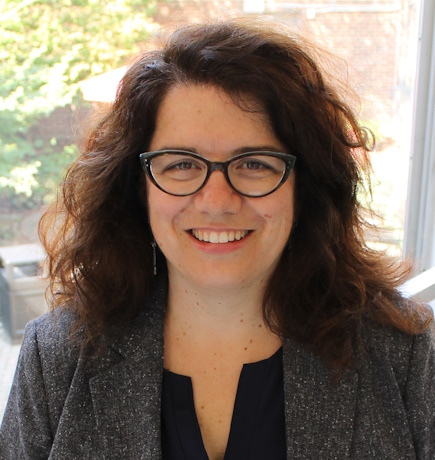Opening doors: SWAN doctoral candidate receives funding to explore how art can expand communication for those with dementia
Laura Sutherland, a doctoral candidate in Wayne State University’s Social Work and Anthropology (SWAN) Joint-Doctoral Program, is passionate about her dissertation project focused on how practices of art shape personhood and social relations among persons with dementia. Her project recently received a significant funding boost, thanks to a WSU Provost’s Steering Committee on Social and Behavioral Determinants of Health (SBDH) 2023 Research Stimulus Program grant.
 “I am grateful to have received this award as it will support my dissertation project,” Sutherland said.
“I am grateful to have received this award as it will support my dissertation project,” Sutherland said.
The goal of the campus-wide initiative is to provide timely funding for ready-to-launch research projects with high scientific merit and programmatic promise in the broad area of SBDH. SBDH’s are a combination of behavioral, social, economic, environmental, and occupational factors, that affect a wide range of health, functioning, and quality-of-life outcomes and risks. Research Stimulus Program grants are reserved for doctoral candidates, and the application process is quite rigorous, requiring a detailed research plan, goals, references, and other supportive data. Typically, no more than eight awards are granted annually.
“The application process was challenging, but I saw it as an opportunity to think through my dissertation project more concretely, and to receive feedback from reviewers across multiple disciplines. I also received support and feedback throughout the process from my advisors – Associate Professor Tam Perry (School of Social Work) and Associate Professor Jessica Robbins-Panko (Department of Anthropology and Institute of Gerontology). Their mentorship was invaluable,” Sutherland said.
Sutherland’s dissertation project, “How art activities influence social relations of persons with dementia: An ethnographic exploration,” involves using ethnographic methods (participant observation, interviewing, and document review) to gather and analyze perceptions of persons with dementia and art activities held by caregivers, facilitators, and other organizational staff, and, where possible, from persons with dementia themselves.
“The number of Americans with dementia is rising dramatically, and dementia is a progressive disease with limited treatments available to slow the progression. The development of interventions that support quality of life and personhood of this population is vital. Art is multi-sensory and can offer communication and expression beyond the verbal. A greater understanding of art engagement by persons with dementia can inform the development of art activities, assist persons with dementia to continue living in the community, and support caregivers in their role,” she explained.
To gain hands on experience, Sutherland has been actively participating in fieldwork at multiple long-term care facilities.
“The time spent learning from the persons who I hope my research can benefit has been both humbling, as I realize how much I have to learn, and wonderful, and I am grateful to them for sharing their lived experiences with me,” she said.
Sutherland, who was in the midst of preparing her dissertation when she received notice of the award, felt “so honored to be selected as part of a group of researchers across the university who are also focused on Social and Behavioral Determinants of Health.”
“I hope that my findings will contribute to new knowledge about the social relations in art activities for persons with dementia, how social inequalities among persons with dementia are perpetuated in care contexts, and how art activities can support the well-being of this population, including practice implications and suggestions for activity design by care institutions, art therapists, and caregivers,” she said.
Author: Laura Hipshire laurahipshire@wayne.edu